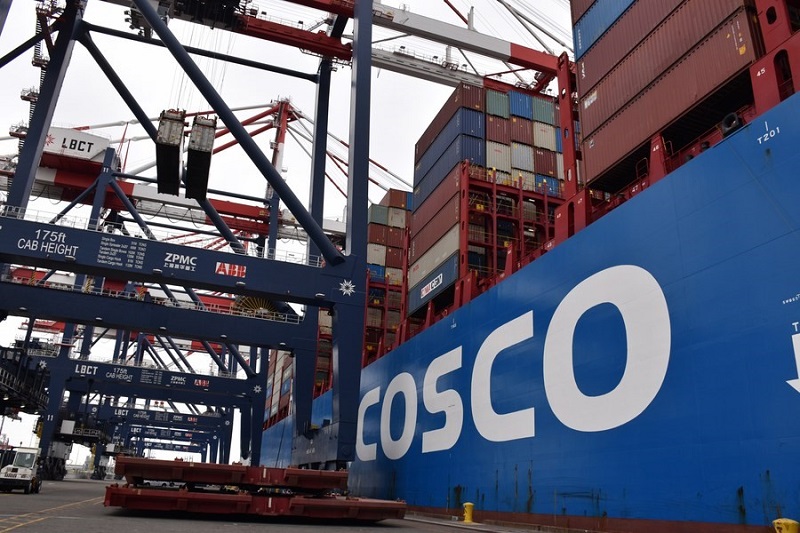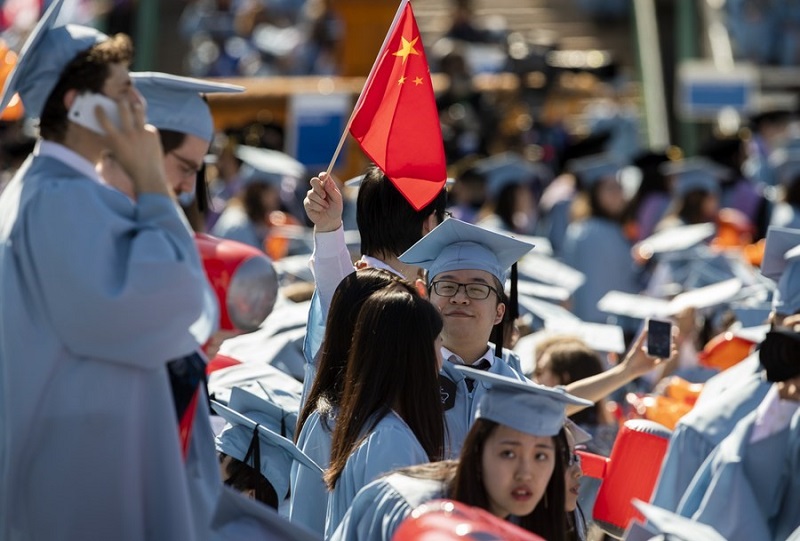While Xi-Biden phone call keeps the pot from boiling over, Nancy Pelosi’s posture over Taiwan shows the cracks in Biden’s administration.

A container ship of China's COSCO Shipping docks at a new container terminal of the Port of Long Beach in California, the United States, on August 20, 2021. (Xinhua/GaoShan)
Chinese President Xi Jinping and the U.S. President Joe Biden’s lengthy two-and-a-half-hour telephone call on July 28 was their fifth since Biden was elected president. The phone communications between the two presidents seem to be one of the few connections between the two governments in the present tumultuous political climate that haven’t got disrupted, and that’s a good thing.
The latest call might have been considered a sign of improved relations had it been more than “crisis management.” But initiated by the U.S., it was based on growing concern over the possible Chinese reaction to a planned provocative visit to China’s Taiwan region by the U.S. Speaker of the House of Representatives, Nancy Pelosi, as part of her four-nation Asian tour of Singapore, Malaysia, Japan and the Republic of Korea. The reaction could lead to military conflict.
Pelosi, whose political career is characterized by enmity toward China, would be the highest member of the U.S. government to visit Taiwan since 1979, if the visit does take place. As the speaker, she is the second in the line of presidential succession and the trip, if it materializes, would give considerable encouragement to those on the island seeking support for “Taiwan independence,” signaling that the U.S. administration might well be in the process of changing its “one China policy.” Hopefully, the growing concern about the proposed visit among U.S. political circles, including the Pentagon and the White House, may convince her to cancel it. Till the time of going to press, Pelosi’s office had not made any reference to a Taiwan stopover.
In his July 28 phone call, Biden was eager to dispel any doubt that the U.S. was prepared to abandon its “one China policy,” which provides the basis for U.S.-China relations. He also reaffirmed that the United States does not support “Taiwan independence.” Therefore if Pelosi appears in Taiwan, it would indicate that not all in the government are of one mind on this matter
China has given very clear warnings, through the Foreign Ministry and through the People’s Liberation Army, that a Pelosi visit would result in very strong repercussions. In the telephone call, Xi again underlined the importance of the Taiwan question as a core issue for China, which would never accept any form of “Taiwan independence,” a position that is strongly supported by the Chinese. Xi also underlined the seriousness of the possible repercussions, warning, “Those who play with fire will perish by it.”
While the conversation between the presidents focused on the looming crisis over Taiwan, Xi made it very clear that the relationship could move away from “crisis management” toward a more congenial and collaborative one. “Faced with a world of change and disorder, the international community and the people around the world expect China and the U.S. to take the lead in upholding world peace and security and in promoting global development and prosperity,” he said. “This is the responsibility of China and the U.S. as two major countries.”
This has been the consistent attitude of the Chinese government for decades, and at one time, it was also the attitude of the United States.
Over the last few decades, as China’s economic development advanced and the U.S. was immersed in interminable contentions and increasing domestic unrest, a rising China began to be viewed as a rival rather than a partner. This mistaken policy was taken to extremes with Donald Trump’s tariff restrictions on China, and continued by the Biden administration, which was also keen to reassert the U.S. role in its traditional alliances, largely ignored by Trump in his “America First” policy. China and Russia were then labeled “autocracies” because of the differences in their systems from Western parliamentary structures, and became obvious targets in the attempt to reassert U.S. leadership in the Western alliance system.
The folly of this shift is apparent in the economic crisis now facing the world. The U.S. refusal to support a diplomatic solution to the Ukraine conflict, and the decision to impose draconian sanctions on Russia have led to rampant inflation in Europe and the United States, which many are now labeling as recession. Even U.S. Treasury Secretary Janet Yellen has publicly stated that eliminating some of the tariffs imposed on China would help relieve the inflationary pressures.
U.S. consumers and producers have benefited greatly over the years from the increase in trade with China. The international division of labor has provided U.S. consumers with their essential needs and helped keep prices low. Reconfiguring the global supply chain in order to rely solely on “allies” for goods will carry a heavy cost for U.S. consumers, already evident in the price of food and energy.

Graduate students from China attend the Columbia University Commencement ceremony in New York, the United States, May 22, 2019. (Xinhua/Wang Ying)
The U.S- China relationship has also benefited Americans in the professional and scientific exchanges between the two countries, with many Chinese studying in the U.S. enhancing the quality of education in U.S. universities, and with Chinese scholars adding to the wealth of knowledge in science and culture in the United States. Without this input from China, the cultural and social life of the nation becomes much poorer.
The measures imposed against China have largely been a matter of the U.S. shooting itself in the foot. That’s why it is stumbling so badly economically and in its ability to deal with the looming epidemics. America should cease with the sanctions, tariffs and other punitive measures in its overstocked arsenal, and once again look toward cooperation with other nations, particularly China.
______________
WILLIAM JONES is a non-resident fellow of the Chongyang Institute for Financial Studies at Renming University of China and a former White House correspondent for Executive Intelligence Review, an American news magazine.